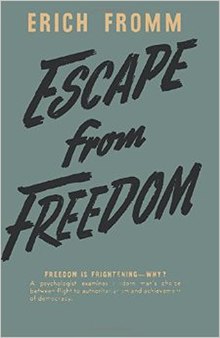Fear of Freedom

Cover of the first edition
|
|
| Author | Erich Fromm |
|---|---|
| Country | United States |
| Language | English |
| Subject | Social psychology |
| Publisher | Farrar & Rinehart |
|
Publication date
|
1941 |
| Pages | 257 |
| ISBN | |
Escape from Freedom, sometimes known as The Fear of Freedom outside North America, is a book by the Frankfurt-born psychoanalyst Erich Fromm, first published in the United States by Farrar & Rinehart in 1941. In the book, Fromm explores humanity's shifting relationship with freedom, with particular regard to the personal consequences of its absence. His special emphasis is the psychosocial conditions that facilitated the rise of Nazism.
Fromm distinguishes between 'freedom from' (negative freedom) and 'freedom to' (positive freedom). The former refers to emancipation from restrictions such as social conventions placed on individuals by other people or institutions. This is the kind of freedom typified by the existentialism of Sartre, and has often been fought for historically, but according to Fromm, on its own it can be a destructive force unless accompanied by a creative element, 'freedom to' the use of freedom to employ spontaneously the total integrated personality in creative acts. This, he argues, necessarily implies a true connectedness with others that goes beyond the superficial bonds of conventional social intercourse: "...in the spontaneous realization of the self, man unites himself anew with the world..."
In the process of becoming freed from authority, we are often left with feelings of hopelessness (he likens this process to the individuation of infants in the normal course of child development) that will not abate until we use our 'freedom to' and develop some form of replacement of the old order. However, a common substitute for exercising "freedom to" or authenticity is to submit to an authoritarian system that replaces the old order with another of different external appearance but identical function for the individual: to eliminate uncertainty by prescribing what to think and how to act. He characterises this as a dialectic historical process whereby the original situation is the thesis and the emancipation from it the antithesis. The synthesis is only reached when something has replaced the original order and provided humans with a new security. Fromm does not indicate that the new system will necessarily be an improvement. In fact, Fromm indicates this will only break the never-ending cycle of negative freedom that society submits to.
...
Wikipedia
